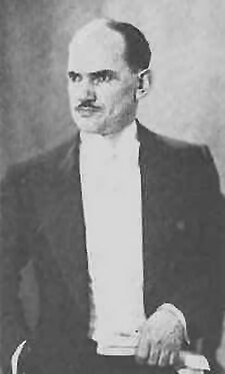Elyesa Bazna
| Elyesa Bazna | |
|---|---|

Elyesa Bazna (Cicero)
|
|
| Born |
Elyesa Bazna 28 July 1904 Pristina, Kosovo Vilayet (now Kosovo) |
| Died | 21 December 1970 (aged 66) Munich, Germany |
| Resting place | Friedhof am Perlacher Forst, Munich, Germany |
| Nationality | Turkish (Albanian descent) |
| Other names | Cicero |
| Known for | Espionage for Nazi Germany |
Elyesa Bazna (Turkish: [ˈeljesɑ ˈbɑznɑ]), infrequently referred to as Iliaz and Ilyaz Bazna (Albanian: [iliaz bazna]), (28 July 1904 – 21 December 1970), was a secret agent for Nazi Germany during World War II, operating under the code name Cicero.
Born in Pristina, Bazna attended a military academy, and joined a French military unit at age 16. He was caught stealing cars and weapons, for which he served three years in a penal labor camp in France. Bazna held a number of manual jobs in Turkish and French cities before obtaining work for foreign diplomats and consulates as a doorman, driver, and guard. He spoke several languages fluently, including French, which was the predominant diplomatic language at the time. In 1943, Bazna was hired as a valet by Hughe Knatchbull-Hugessen, the British ambassador in Ankara, Turkey. He photographed British documents in Knatchbull-Hugession's possession, and sold them to the Germans through their attaché Ludwig Carl Moyzisch in what became known as the Cicero affair.
As Cicero, Bazna passed on important information about many of the Allied leaders' conferences, including the Moscow, Tehran and Cairo Conferences. The details for the Tehran Conference were important for Operation Long Jump, the unsuccessful plot to kill Franklin D. Roosevelt, Joseph Stalin, and Winston Churchill. He had also conveyed a document that carried the highest security restriction (BIGOT list) about Operation Overlord (the code name for the Invasion of Normandy in June 1944). It included intelligence that the British ambassador was to request the use of Turkish air bases "to maintain a threat to the Germans from the eastern Mediterranean until Overlord is launched." The information about the Normandy Invasion was not known by the Germans until after the war. Had it been provided in time, Operation Overlord (the preparations for D-Day) could have been compromised. He also provided intelligence that might have made the Germans believe that there was no danger of attack in the Balkans. The information that he leaked is believed to have been among the potentially more damaging disclosures made by an agent during the Second World War. The German Foreign Office questioned the intelligence provided by Cicero due to the large quantity of transmitted documents, which meant that little, if any, of it was acted upon.
...
Wikipedia
